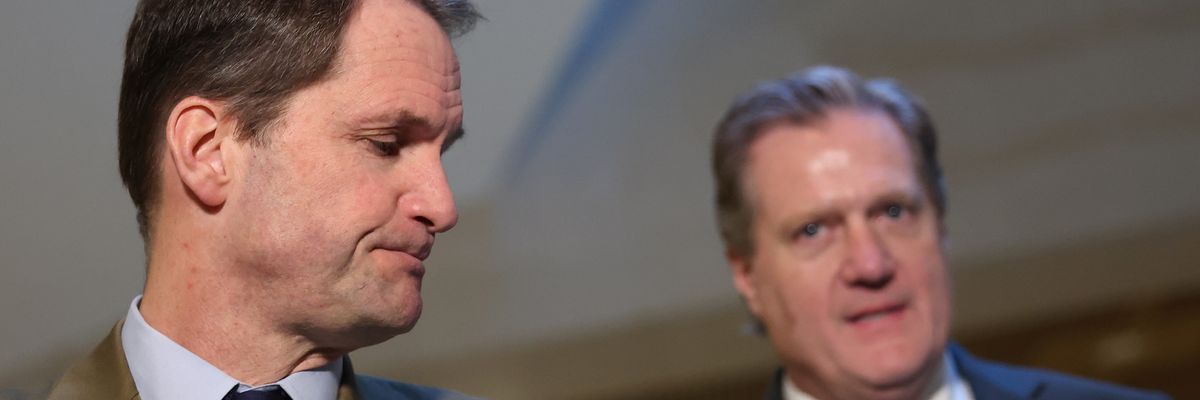NSA whistleblower Edward Snowden is among the privacy advocates sounding the alarm over a major expansion of mass surveillance that the U.S. House
approved in a bipartisan vote last week, a step toward handing the federal government—and a potential second Trump administration—even more power to spy on Americans' communications without a warrant.
Sean Vitka, policy director of Demand Progress, used social media to press the top Democrat on the House Permanent Select Committee on Intelligence (HPSCI) on the implications of an
amendment that the lower chamber approved as part of a bill to reauthorize Section 702 of the Foreign Intelligence Surveillance Act (FISA).
"Did you know your FISA [electronic communications service provider] amendment facilitates Stasi-like powers, very plausibly for [former President Donald] Trump? I asked your staff if you were lied to about it or if you knew. Can you confirm?" Vitka
asked Rep. Jim Himes (D-Conn.) on X, the platform formerly known as Twitter. (Trump, the presumptive 2024 GOP nominee, has postured as a FISA opponent, but as president he signed an extension of Section 702 authority.)
Vitka noted Sunday that Himes repeatedly characterized the amendment—which was led by HPSCI Chair Rep. Mike Turner (R-Ohio)—as narrow, even though it would dramatically expand the kinds of businesses that can be forced to help the government conduct surveillance operations under Section 702, possibly handing a
would-be authoritarian chilling surveillance powers.
As the Brennan Center for Justice
explained, "Although the amendment exempts hotels, libraries, restaurants, and a handful of other types of establishments, an enormous range of businesses could still be conscripted into service, including grocery stores, department stores, hardware stores, laundromats, barber shops, fitness centers, and countless other locations Americans frequent—even the offices in which they work."
"Moreover, although the targets would still have to be non-U.S. persons overseas, many of these businesses would lack the technical ability to turn over specific communications, so they would be forced to give the NSA access to entire communications streams—trusting the government to retain only the communications of approved targets," the group added.
Section 702 permits U.S. agencies to spy on non-citizens located outside of the country, but the communications of Americans—including activists, journalists, and lawmakers—have
frequently been swept up under the surveillance authority, sparking a bipartisan reform push.
Himes, an
opponent of reform efforts, responded dismissively to Vitka's question on Sunday, writing that "life is really too short to engage with people who need to use bombastic absurdities like 'Stasi-like.'"
"Yes I know exactly what is in there," Himes added, referring to the Turner-led amendment. "Some of it is classified. And none of it is remotely 'Stasi-like.' Sell your nonsense elsewhere."
Snowden, who in 2013 exposed the NSA's
illegal mass surveillance program, said in response that "the 'it's classified' dodge" by Himes "is a bright red flag."
"This amendment radically—and I repeat radically—expands the range of who the gov't can force to spy on their behalf. It may be law in DAYS!" Snowden wrote on social media.
Snowden went on to argue that Vitka's "invocation of 'Stasi-like' is not only a fair characterization" of the amendment, "it's probably generous."
"Frankly, it's hard to imagine any modern communication beyond the reach of this thing—which is, of course, the true reason they're trying to sneak it into law so quietly," he added. "It is unbelievably overbroad, and in my opinion no country that has something like this to enter into force can still be considered to be free."
"The House bill represents one of the most dramatic and terrifying expansions of government surveillance authority in history."
Elizabeth Goitein, co-director of the Brennan Center's Liberty and National Security Program,
said the "disregard for Americans' civil liberties" in Himes' reply to Vitka "is staggering."
"This provision allows the NSA to force a huge range of ordinary U.S. businesses to assist the NSA in Section 702 surveillance," Goitein added. "That's not 'nonsense,' that's a fact. And this is your response?"
The Reforming Intelligence and Securing America Act (RISAA), described by some as "Patriot Act 2.0," passed the House in an overwhelming bipartisan vote last week after mass spying supporters—including the Biden White House—defeated an effort to add a search warrant requirement to the bill.
But the legislation still has to clear a procedural hurdle to reach the Senate. Later Monday, the House is
expected to vote on whether to table a motion to reconsider RISAA's passage.
If the bill does reach the closely divided Senate, privacy advocates are expected to continue their fight for meaningful reforms.
"The House bill represents one of the most dramatic and terrifying expansions of government surveillance authority in history," Sen. Ron Wyden (D-Ore.) said in a
statement following Friday's House vote. "It allows the government to force any American who installs, maintains, or repairs anything that transmits or stores communications to spy on the government's behalf. That means anyone with access to a server, a wire, a cable box, a Wi-Fi router, or a phone."
"It would be secret: The Americans receiving the government directives would be bound to silence, and there would be no court oversight," he added. "I will do everything in my power to stop this bill."
